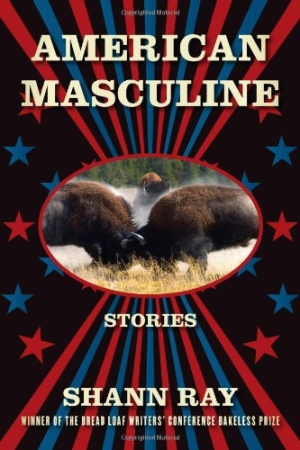American Masculine
Shann Ray’s debut story collection has already won the Bread Loaf Writer’s Conference Bakeless Prize. “The sentences in this book,” writes contest judge Robert Boswell, “have such grace and muscularity that they seem more performed than written and the author’s images and events carry the nearly visceral weight of memory.” Boswell goes on to explain how, shortly after reading the collection, he described a dream to a friend that involved a train, but soon realized he was describing the train in one of Ray’s stories. These stories, he notes, were “nosing [their] way into my life, making claims on my experience. The work has that kind of resonance.” That’s what strong storytelling does; like the vibration of a drum, there is a sort of beat long after the story is over.
There is a quiet reverence for both life and land in these ten stories set in the American West. In some cases the two are knit together. From “When We Rise:” “As a boy Shale felt they existed in a nearly rootless way, he and Weston, like pale windblown trees in a barren land. Their father’s land, to be precise, the land of a high school basketball coach.” The boys’ father is pursuing a basketball dynasty, a “team that would reach the top with Shale’s dad at the helm and make something happen that would be remembered forever. His father had been trying to accomplish that since before Shale was born and it got flint hard at times, the rigidity of how he handled things.”
The characters’ lives, like the lands on which they live, are not easy. Alcoholism is a struggle for almost everyone, the pull of drink close enough to feel. Nathan Bellastar desperately wants to stop drinking for the sake of his lovely newborn daughter. “He could nearly taste the bite of the alcohol in his mouth, the hot spiral in his throat as the whiskey went down.” “The Way Home” profiles an agonizing truck ride, where Nathan battles with himself to not stop for that one drink with his friends at the Jimstown bar. He decided, before his daughter was even born, that he would be her father. He knew, deep down, what that would mean. “Quietly, but aloud, he said his daughter’s name—‘Noel.’ At the sound of it something increased in him and as he drew near to Jimstown he kept the pedal down.”
Life for Ray’s characters is complicated, but he doesn’t leave them to wallow in their pain. Recovering alcoholic Benjamin Killsnight catches his wife and best friend in bed together in “How We Fall.” He chooses sobriety; she doesn’t. It’s a story of tough love, and ultimately, of redemptive love and the journey home.
Ray, who has a Ph.D. in psychology, is not afraid of the darker sides of human nature. In fact, he marches straight into the muck of it. In “The Great Divide” the big, bull child (as he is called by his father) “enters his first real rodeo at thirteen in Glasgow and on from there, three broken fingers, a broken ankle, broken clavicle, and a cracked wrist bone. Otherwise unharmed, he knows the taste of blood, fights men twice his age while going to bars with his father. When he loses, his father grows quiet, cusses him when they get home, beats him. When he wins, his father praises him.” There is war between good and evil and the child grows up not quite sure which category he belongs in. In “Rodin’s The Hand of God,” a father tries to coax his grieving daughter back to life. This same man who had failed her many times in a variety of ways is the one who becomes her lifeline after the tragic death of her children.
The need for some sort of forgiveness—the messy, complicated aspect of all relationships, whether with others or with ourselves—lingers in the background of almost every character’s life in the collection. Ultimately, the men and women that make up American Masculine are brave souls, shouting against the wind, choosing to change, choosing hope.
Reviewed by
S. Hope Mills
Disclosure: This article is not an endorsement, but a review. The publisher of this book provided free copies of the book to have their book reviewed by a professional reviewer. No fee was paid by the publisher for this review. Foreword Reviews only recommends books that we love. Foreword Magazine, Inc. is disclosing this in accordance with the Federal Trade Commission’s 16 CFR, Part 255.

